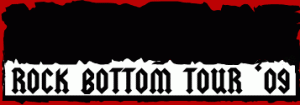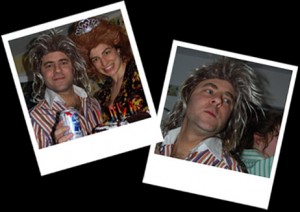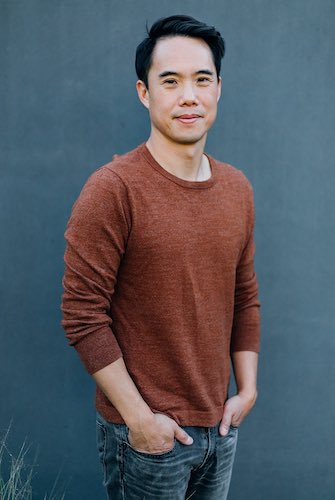The Drummer’s Revenge: An Interview with Michael Shilling
After graduating from NYU, Michael Shilling moved to Seattle, where he was a copywriter in the first dot-com wave and wrote arts criticism for the city’s alternative weekly, The Stranger. He played the drums in numerous bands of varying degrees of local success, from the gig-starved Sonica to the Biggest Local Band of 1998 Western State Hurricanes. He also played in The Long Winters, specifically on their 2003 release When I Pretend to Fall. Upon leaving The Long Winters, he turned his energy to short stories, which have since found homes in The Sun, Fugue, and Other Voices. In 2005, at the dubious agreement of his wife, he moved to Ann Arbor. He earned his MFA in Creative Writing from the University of Michigan, where he is now a lecturer in the English department. About Rock Bottom: Blood Orphans were a sure shot for rock and roll immortality, and then everything went wrong. Rock Bottom (Back Bay Books, Jan 2009) chases the band around Amsterdam as they come to grips with their misfortunes and failings and try, one last time, to outrun them all.
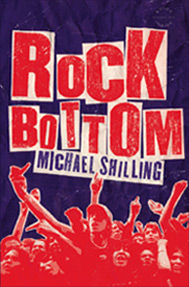 Liana Imam: From 2001-2004 you were the drummer for The Long Winters. You guys did tours with some pretty heavyweight people, so what was it like being a touring musician?
Liana Imam: From 2001-2004 you were the drummer for The Long Winters. You guys did tours with some pretty heavyweight people, so what was it like being a touring musician?
Michael Shilling: It was very fun. It’s mainly highs and lows. And I took certain essences of touring life into the book. The book is not at all autobiographical, but it is of course informed by autobiography—certain kinds of loneliness and joy and failure and success. A sense that everything you thought you wanted—and as far as what you thought glory was—is actually despair. Those kinds of emotions, to take them and sort of learn how to write about them in the context of another musician, was what I took from touring. Because touring is really, really fun until suddenly it’s really lonely. It’s an extremely lonely experience. And it’s a lot less lonely if you’re single. So if you’re not single you’re really not in the party so much.
So you didn’t go out for three days at a time and play one show and have these really high and low moments that they have?
No, we had the high and low moments but we had about one thirtieth of the drugs, because we had done the drugs already. And we weren’t a band that had a lot of groupies, so we didn’t really have to deal with that. We pretty much sat in a van and argued about Bono as a public figure and what Gore would have done as president, that kind of stuff. So even though the experiences are different the core anti-values that inform them are similar.
Was there any particular spark, then, that set off the writing of the novel?
I tried to write an autobiographical rock novel. Not about the Long Winters, but another band I’d been in called the Western State Hurricanes, and it was really bad. It was terrible. I had to stop a hundred pages in and just stop doing it. And at the same time I was reading The Corrections, which is a book I really love, and I saw how you could tell a story in a certain kind of narrative, a certain kind of omniscience, that could really express a certain kind of sorrow, and I was really inspired. But mainly desperation, like, I just spent eight months writing an autobiographical novel, so maybe I should try something that’s not based in autobiography. So, desperation. Probably how a lot of writers do it.
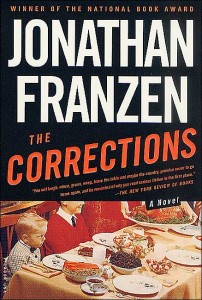
Did you find that there were any bridges between the creative processes of writing and music?
As far as the two different kinds of art forms, being in a band is much less fun. Especially when you’re the drummer. Because now I get to be the lead singer and the songwriter and the producer and it’s really great. It’s not collaborative so you don’t have to develop any interpersonal skills to write a good book. (Laughs.) So I vastly prefer it, because nobody in the Long Winters has good interpersonal skills, including me—and I hope you’re reading this, guys, because it’s all true. So, what I’m saying is that writing is a much easier thing to do than being in a band. It’s very, very difficult. It’s like being in a permanently chaste relationship with a lot of chemistry, even though it’s not exactly sexual.
And was writing something you always saw as part of your future?
I’ve always written. I wrote two novels that turned out to be practice novels, but I didn’t know that at the time. And I always liked to write. I’d written some arts journalism for a publication called The Stranger in Seattle and I just kept trying, just kept writing fiction, and sooner or later I wrote some stories that were pretty good, good enough to get published. And writing is sort of a matter of time. It’s sort of a last man standing—or last woman standing—enterprise. If you’ve been writing for fifteen years you might be really, really comically terrible, but most people that have been doing it for a long time, it’s because they’re good at it.
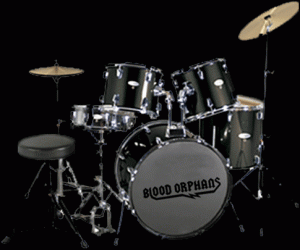
Now, on to the novel more specifically. It’s set over a day in Amsterdam, which is for better or worse known for red lights and legal drugs. It seems like exactly where they need to be at the fallout, but is there something more behind that?
Originally there was. I thought band existence and Amsterdam were analogous because both are places that are known for their own little versions of sin cities, but in reality what they are is super uptight. Musicians and artists in general are all control freaks, so if you’re a writer or a painter you can be a control freak on your own time. But if you’re in a band you have four competing control freak dynamics, and as a result it’s not sort of free and easy, all for one at all. Except for when you’re on stage and then it’s really fun and makes it worth it. And I thought that Amsterdam also had a reputation for one thing, libertinism, but then it was actually pretty uptight. But then I realized that that was completely bogus and that I should leave Amsterdam alone and not pick on it, and I basically just decided, “Well, it’s already taking place there.” And Amsterdam’s a pretty place and I’d rather write a novel in a pretty city than, I don’t know, El Paso, which is a very ugly city, or Hamburg, which is where I originally thought it would take place. So I just kind of stuck with it.
On the same note, the idea of that rock star life, especially in films, is so romanticized. It even gets this kind of rosy grittiness, but you don’t glorify Blood Orphans in any sort of way like that.
I set the novel up as a challenge to myself. Like, can I write about a bunch of scumbags and make it good? Cause I’m drawn to and fascinated by a relative amount of seediness. Or not seediness, but just desperation. Desperation is something that is interesting to me as a writer, and I wanted to see how far I could push these characters. Like, how bad could they be and still make them human. So it was a little bit of a dare to myself and I’m really pleased that a number of little reviews that have come in thus far have said that it’s surprising that this is good at all because the subject matter and the people are so revolting. But they become human quickly as you read the book, and that’s a real accomplishment to make these people really people. So I’m just really pleased, cause I’m never writing about these people again (laughs).
I did find them sympathetic, actually, especially toward the end.
Who did you find more and less sympathetic? Who did you like?
Maybe this is counterintuitive, but I actually felt the least for Adam, because he’s kind of the throw rug and the pushover. And I really liked Bobby, I think maybe because Bobby was the first one I met, and he was just so sad with his bandaged hands. But I wonder how you judge them?
The book is about Darlo and Joey, for me. The book is definitely about them. Bobby and Adam, you know, are weaker. Shane is somewhere in the middle. And Darlo is, I think, the heart of the book, because that’s where shit gets real and serious and intense. I cared the most about him. He was a real person to me, so is Joey, but I really wanted to honor the horrible things that happened to him. And I also said, again, that it was a dare. People write about pornography and the porn industry and it’s usually very stock. And so I just wanted to find a way to have it not be the special thing in this guy’s life. I wanted it to be as mundane as the paint in this house, just an assimilated part of his psyche that he couldn’t separate. Pornography was something that would always be part of his life, and I wanted to defetishize it that way. What did you think about Darlo?
I liked him a lot. I loved that part about…how did you phrase it? Him chasing his horizons, I think.
The tether, yeah, his ancestral latitude.
Yes, and trying to break that down. And I definitely liked Darlo and Joey. They were both just horrifically…damaged.
And you can sort of sense the chemistry between them.
Totally. And I think Darlo’s dark and light and pulling between them seemed very universal and also very individualized.
Cool. I’m glad. As far as writing techniques and strategies and craft-wise, I don’t know if you’ve had this experience yet, you probably have, where you come up with this super great metaphor and you know it’s great but you think, “If I use this metaphor now I can never use it again. Like, it’s used. I can never invoke ancestral latitude again as a writer. It’s done. So am I gonna do this? Oh my god, I hope I can finish this book and people can read it because I’m really excited about this metaphor.” So I’m glad that that didn’t seem forced.
No, I think Darlo is perfect for the ancestral latitude. One of my biggest problems in my writing is juggling a big cast of characters and so I was really impressed by the distinctness of each of your narrators. What was your goal with the multi-narrative?
One thing I did—which I have to thank Eileen Pollack for, one of the great writing teachers—I had a draft I gave to her and she said, “It’ll be good when something happens in the first half.” (Laughs.) I love hearing what’s wrong. So I was like, “Interesting, nothing happens in the first half. Okay, Eileen.” But no, she was right. She said, since the tone is similar in each of these five omniscient characters, you have to find specific things that each character does or doesn’t think, or does or doesn’t say. For instance, she said, in every one of the chapters you use the construction faux-this or faux-that. Faux-caine instead of cocaine. You can only do that for one character. So there were a number of things like that. There’s certain different things that each character thinks that I had to then make sure only happened within those narrators. And also changing the rhythms a little bit. Certainly with Darlo it’s more clipped and it’s a little bit more prose poem-y at certain times, like the scene in the dungeon where he saves the girl. I tried to make it a little more hard-boiled sounding. More staccato rhythm in the sentences and shorter sentences, shorter paragraphs, that kind of thing. I just tried to identify what little things characters would or wouldn’t think as their tics as a way of separating.
One of the questions that I found in the novel was how seriously this band should be taken. They even refer to themselves as a joke band at points, so I wondered how seriously we should take them, and your objective with parody in the novel.
I think that satire is a portal into seriousness, or it’s useless. I think everything should be a portal into seriousness. I don’t actually like or give a shit about stuff that’s just funny for funny’s sake. So, as a result, I wanted people to be fooled into liking them through the humor, and fooled into taking them seriously through the humor. Because you can’t have—or you can, maybe, if you’re a fucking genius—you can’t have a book about these people that opens like (in a low, gravelly voice), “It had been a really tough tour. Blood Orphans were miserable. Bobby’s hands, ugh, you should have seen them.” Who cares? I don’t care. I want people to take them absolutely totally seriously because I love them and I want them to figure out their shit. I definitely think that I am making fun a little bit. Maybe at the beginning, before you get to the characters, I’m sort of making fun of the clichés of the Dream Machine a little bit. But I don’t think there’s that much This is Spinal Tap in this book, you know. I mean, I love Spinal Tap.
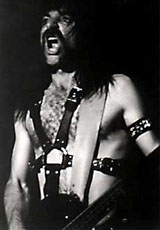
My friend was just telling me for the hundredth time yesterday that I need to see Spinal Tap.
It’s a really great movie. It’s pure parody. It’s a complete work of art. But that’s my point: I don’t need to do anything Spinal Tap did because they did it better. And that’s the thing too, as a writer, is to strive, in the sage words of Ezra Pound, to make it new. There’s no point in writing something if you feel like it’s been written before. I just really felt like with these guys there was something essential and unusual and interesting about their story that I had not seen before and I just wanted to bring out their specialness. So yeah, I did take them very seriously. Did you?
I did end up taking them seriously. But I think it’s very easy to just see that underside and the parody in it, so I wondered if your friends or contacts in the music industry have read it yet, and what their reaction to it has been.
Interesting you should ask. Well, some of my friends…let’s see. I have a bunch of friends who read it that are musicians, some of whom are touring musicians, and pretty much they’ve all liked it. I’ve got a buddy who plays in Duff McKagan’s band, from Guns ’n Roses, a band called Loaded. He tours five months out of the year and he’s got tattoos on every square inch of his body. He called me up and he said, “Man, this is it. You really nailed it.” So I was very pleased. I haven’t had any musicians be offended by it yet—or they haven’t told me—or think that it was not an accurate representation. What I’m working on now is something that takes place a hundred and seventy years ago so it’s very easy to call me a poser, which I worry about. But certainly the good thing about writing what you know is that at least you know it’s accurate as far as the life.
When you were writing, then, did you feel like you had a responsibility to that world you were exposing?
Yeah, I had a responsibility to have it be accurate. I just had a responsibility to tell a story that felt true. You know, would Spin really call out some unknown band as racist? Certainly that’s a stretch, that’s a device. It’s the leap of faith you take with a book. So that is probably not realistic at all but it’s couched within such a sort of farcical tone. Or, like you said it’s a parody. So I can get away with it. But as with anything, I write to try to tell a story about real people that’s true, and so as a result you have to get the setting down. You can’t make the sky purple. The sky’s just not purple.
I have several friends who are in bands.
Good for them. It’s a game for youth.
So I’m sort of around people who are not quite as intense as Blood Orphans. I’ve become thick skinned enough as to be mainly amused by the things that happened, but women don’t exactly get the best end of things in the novel. Were you concerned at all about the reactions of people who weren’t immunized to this environment?
No. If you write a story that is about people and is real and reflects human emotions and human dynamics and you take care of that, then whatever else happens is just part of that verisimilitude, the creation of reality. There are certain books that are not for everybody, and I certainly was not out to convert people to this style of writing. I don’t wish to offend anybody, and I do hope to bring in people through the story itself, and the universality of the suffering of these characters and the struggles. I hope that people read it that don’t normally read this kind of stuff, but at a certain point I just stop worrying about it. Because the reality is that the music business is nasty. And living that life is nasty. And the people that are in power, the women that I’ve known in bands, they don’t act very nice either. I should say just for the record that most of the people that I knew when I was in the Long Winters and touring, almost everybody was really, really nice. It’s just these people you meet on the periphery that are just weird and freaky. But I’ve never been one in my life to worry. I’ve always been blunt.
Let me ask you a little bit about Joey. I don’t think the book would work without her at all.
Did you feel that the book was lacking for female energy?
Joey didn’t feel faked and she didn’t feel there because it needed a female touch. And I think that there was enough of the presence, it wasn’t super fleeting. With the two sisters that Bobby and Shane end up with, I think that was a good measure of the different ends of band life—where the younger sister is this band-obsessed starfucker and the older sister who’s with Bobby is more mellowed out and just there.
Just a person, more mature.
Yeah exactly, very normal. I definitely think it was there, although I was glad that I didn’t find myself relating too much to any of the women in it.
I wanted Danika the crazy one, to be a little heroic. My feeling about people that hang around musicians is that they think it’s really cool that people play music, and it turns them on. And that’s no sin. I mean, there’s people that feel the same way about doctors and accountants. There are accountant groupies somewhere, you know. They exist. People are turned on about all sorts of stuff. So I didn’t want in any way shape or form to have it seem like that was lame and dirty to be attracted to musicians. I wanted Danika to be in some way dignified. She doesn’t end up being dignified at all. I didn’t carry that off because there just wasn’t enough space in the book for her. I at least wanted her to best Shane, which she totally does. She floors him kind of literally. Which, he had it coming. And as far as Sarah, I wanted her to be almost a major character. But again, I wanted her to not just seem like some person who hangs around rock musicians, like it was an accident that they met. But I wanted in some way the proportions between the amount of men and the amount of women to mirror the rock and roll world, which is a three to one kind of ratio. There just aren’t as many women around.
Julian Barnes has said that art proceeds by indirection. It seemed to me that one of the troubles with Blood Orphans is that they have no indirection. They have this very easy road to fame and so they sink right into it. I wondered if you could talk about how their easy fortunes affect them so much for the worse?
You mean because they never had to fight for it?
It just sort of falls into their lap.
Well, they have such massive hubris. Darlo is born with an extra hubris chromosome, okay, which is also why he’s the main character of the book. Because he’s just from a genetic pool of hubris. I know people like that. And as someone that’s not a shrinking violet, that’s just personality, and that’s why he’s the engine of the book. He’s the heart of the band and he’s emblematic of their, “We’re just the fucking best,” even though everybody but Darlo knows that they’re not the fucking best at all.
So is that naivete part of it? That you just don’t know until everything’s literally fallen down around you?
I think it took them a very long time because if you’re twenty-five years old and you sign a record deal for a squillion dollars, you are pretty sure that things could never go wrong again. Money talks, and absolute power corrupts. I’m sorry to quote Sting, but I kinda like Sting. And he said, “If The Police had gotten big when I was in my early twenties and opposed to my early thirties I would have died doing it.” Rock musicians—most of them, and good for them, as was I—are people that spend their entire lives thinking, “I want to play Madison Square Garden in front of 20,000 people and then I can die happy.” That’s all they care about. They don’t really know how to relate to people, they don’t really know about being with people. The good writers I know…kinda weird people. Not just the poets. The fiction writers. Part of being good at creation is seeing a certain kind of absolute reality that only you can see and you can’t really explain to anybody else, and that makes daily life a little trickier. And Blood Orphans are not exactly artists, but they’re single minded. So the point is that if you’re validated early in life like that with a million dollars, then you are gonna lose your mind. I mean, I would’ve. I don’t know how anybody could not. If you’re given that anointing, you know. So I think that’s why it takes them so long. Bobby and Adam, certainly, and Joey have figured out a long time before the book opens that they’re toast. It’s only Shane, because he’s such a smarmy little jerk, and Darlo, because he’s not bred for failure. They’re the ones that really don’t know it. So I think that that’s part of the tension of the book. Whereas if all of them knew they were toast it would deprive the characters of their interactive tension. So that’s why I have some of them kind of knowing it’s the end and Darlo just thinking like, “Well we’ll just take a month off and then all just keep rocking.”
On that last point, a lot of the present action does overlap, especially toward the end, and there isn’t a whole lot of it, which kind of felt counterintuitive to me because the rock star model is all about immediacy and moments, so I wondered if the novel was always so much about introspection and looking back?
Since I set it up as it was going to take a day, I didn’t have a lot of room to move in terms of present action without making it seem a little bit hokey or madcap. Like, we have all these different things we have to do on this last day of touring and no one gives a shit who we are! So that’s why it was fundamentally introspective. I cut a tremendous amount of introspection out. The book was, like every novel, much longer. And I just cut a third of it out which was just back story, just more and more back story. So as a result there’s probably more back story than present action. 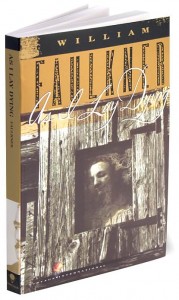 It’s meant to model, at least spiritually, As I Lay Dying. It’s about a bunch of people carting a dead thing across town. That was kind of what inspired me along with The Corrections. But As I Lay Dying was kind of the spiritual, aesthetic inspiration for this book. I was like, “I want to do an As I Lay Dying for rock musicians.” And I’m sure I didn’t because that novel is amazing. But I wanted to at least give it a try, just as sort of as a craft thing. A lot of people in writing school—whatever that is—are taught to use models, which I totally agree with. Imitation is the way to go. But it’s easier to do that with a short story. To say, you know, “Oh, I wrote this story about a bunch of psychopaths roaming the countryside.” Oh, it was inspired by “A Good Man is Hard to Find.” Whereas with a novel, I think it’s equally, at least for me, super useful to find other spiritual ancestors—even if they have nothing on their face in common with the book—to keep you going. And As I Lay Dying was that book for Rock Bottom. So, thanks, Faulkner.
It’s meant to model, at least spiritually, As I Lay Dying. It’s about a bunch of people carting a dead thing across town. That was kind of what inspired me along with The Corrections. But As I Lay Dying was kind of the spiritual, aesthetic inspiration for this book. I was like, “I want to do an As I Lay Dying for rock musicians.” And I’m sure I didn’t because that novel is amazing. But I wanted to at least give it a try, just as sort of as a craft thing. A lot of people in writing school—whatever that is—are taught to use models, which I totally agree with. Imitation is the way to go. But it’s easier to do that with a short story. To say, you know, “Oh, I wrote this story about a bunch of psychopaths roaming the countryside.” Oh, it was inspired by “A Good Man is Hard to Find.” Whereas with a novel, I think it’s equally, at least for me, super useful to find other spiritual ancestors—even if they have nothing on their face in common with the book—to keep you going. And As I Lay Dying was that book for Rock Bottom. So, thanks, Faulkner.
Within the novel itself there are discussions about creating narratives and the justifications of the self through art.
Is that from Charlie Baxter’s book?
No!
Because I don’t understand it. (Laughs.)
I guess, specifically, I remember Adam talking about stuff his art teacher has said. The idea that this is my art and this is my self and I have to make my self through my art.
I guess I didn’t even really think about that. As far as Adam goes, remembering his different professors—art informed by ego is trash, whatever Professor Sweet says—that was straight parody of art school. I had lots of friends who went to art school, and they’re fucking crackpots. They’re lovely people, but just like most of the people that are accountants—we’ll just go back to accountants because it’s the opposite—most accountants aren’t very good either. They’re just doing it because they know how to do it and they can make a living, and good for them. But accountancy can be a real art form. It’s true.
My parents will be glad to hear it.
I’m really fascinated by accountancy! And dentists. So, same thing with art students and musicians. It does bleed over, and I don’t know anybody that went to the Berkeley School of Music or Juilliard, but it’s so wrapped up in these cerebral ways of expressing what is really a visceral experience. So as far as that element of Adam’s experience, I think that the parody part is a way of illustrating how he’s screwed himself a little bit by trying like, “I’ll do anything I can to get as far away from my past in Bakersfield as possible. And if it means selling out to play in a junk rock band? If it means I’m gonna live with Darlo Cox? No problem.” I think that’s kind of subconsciously, unintentionally, probably why I put that in there. But it was also just a little bit of a tribute to Art School Confidential, which is just one of the greatest comic books I’ve ever seen.
I found it interesting, too, or maybe a little bit sad, that all these boys come from a sort of scoffable background.
A what background?
Scoffable. Is that a word?
It is now. Not scoff-worthy.
I mean, Shane was in this Christian rock band, and Bobby is the passenger musician, and Adam has a non-ironic mustache—
(Laughs.) The ’tache! The Fu Manchu! Those things are based on reality, those things are part of—well I don’t want to interrupt you, you had a question coming.
Well, I mean, Darlo’s kind of the only one who has what anyone might consider a romantic or desirable life, and they all kind of go into this project hoping that it’ll sublimate them. Do you think that it does?
You mean that the experience will take them out of their clichéd lives?
And that it’ll give them something that’s more than a cliché.
A sense of validation. Yeah, of course. I think that is why they all sell their soul for rock and roll, as the saying goes.
Who wouldn’t?
Who wouldn’t. I know that I tried very hard. But I definitely wanted to use the band as like, “This is my ticket out of cliché.” I mean, it isn’t. But it ends up being, I think, hopefully a portal to their understanding about their complicity in their own lives. As far as universality and character and to transcend, I do actually want a ninety-year-old lady in an old folks home in Fresno to mistakenly read this book thinking it’s something else. I actually aspire to that because I want to get to these underlying human issues that everyone struggles with, and one is how everybody, I think, struggles with owning the complicity in their own choices, being responsible for what they’ve done and not done. And that was really why I set up all these strange ways in which, for different characters, Blood Orphans was the ticket out. Of course, when you get into it you find that there is no ticket out. You just have to figure your shit out. That’s the only ticket out.
You had touched on your next project, which is set in 1820s England, and described by you as Jane Eyre meets The Wire—
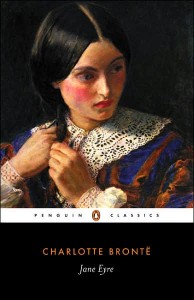
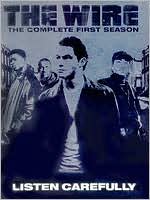
Though not as good as either, I’d just like to quickly point out. (Laughs.)
Fair enough. So I guess that a) I would like to know what that means, and b) why you decided to go in such a vastly different direction.
The working title is The Hierophant, which is a tarot card character. The Hierophant is, among other things, the connector between differences, and between heaven and earth. And many other things, because tarot cards have many meanings depending on who’s reading it. So, when I say Jane Eyre meets The Wire, the Jane Eyre part is that there are 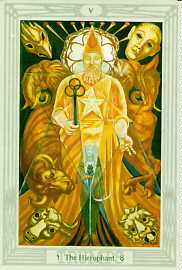 characters from Jane Eyre in the book. Rochester is in it, Bertha’s in it, Miss Fairfax, those three. Grace Poole is in it. And it involves those characters, though Jane is not currently in it. She might end up in it later, as a minor character. It takes place before the story of Jane Eyre, so it will end up involving a couple of incidences. But it’s mainly just taking existing characters and making something anew of them, kind of like Wide Sargasso Sea does with Bertha, although Wide Sargasso Sea is also a masterpiece, and one of the most totally successful books I’ve ever read without a shred of humor. It’s utterly humorless but it’s totally fucking brilliant. And The Wire part, what I mean is that it is a large ensemble cast in which each of the characters have very specific desires. And all the other characters are both getting in the way of those desires and—strangely and surprisingly, through shared shades of past—intersecting with those desires. Have you seen The Wire?
characters from Jane Eyre in the book. Rochester is in it, Bertha’s in it, Miss Fairfax, those three. Grace Poole is in it. And it involves those characters, though Jane is not currently in it. She might end up in it later, as a minor character. It takes place before the story of Jane Eyre, so it will end up involving a couple of incidences. But it’s mainly just taking existing characters and making something anew of them, kind of like Wide Sargasso Sea does with Bertha, although Wide Sargasso Sea is also a masterpiece, and one of the most totally successful books I’ve ever read without a shred of humor. It’s utterly humorless but it’s totally fucking brilliant. And The Wire part, what I mean is that it is a large ensemble cast in which each of the characters have very specific desires. And all the other characters are both getting in the way of those desires and—strangely and surprisingly, through shared shades of past—intersecting with those desires. Have you seen The Wire?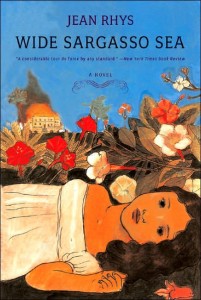
I haven’t.
It’s like The Sopranos. This very long ensemble cast kind of thing, but The Wire is the best version of it by far. So that’s what I mean by connecting these two types. One is strategy and one is the characters. And the reason I got interested in this is because it takes place in late Regency England, so 1820s, 1829. There’s a part in which Rochester dresses up like a gypsy and tells people their fortune. And I read it and I thought, “This is a part of a classic novel that no one talks about, in which the dude—the Byronic hero—cross dresses. Like, what the fuck? Why isn’t this talked about in my English class when we took Jane Eyre?” So I thought that just opened an entire door to what Jane can’t see, because Jane is one of the great myopic characters. She sees nothing but the face of her fantasies. So that’s where is started. I just thought, “Some amazing weird shit is going on in Thornfield.” The book also involves resurrectionists and what was going on politically at the time in terms of political reform and emancipation of slaves in the Indies, and also Catholic emancipation in England. And it’s hard-boiled—well, I want to make it hard-boiled—but it’s dark, like seemingly every book that’s written about that time period. And also it’s the opposite of Rock Bottom. Maybe one day I’ll like to do the same thing twice, but right now I like to write really, really different stuff. It’s just much more fun. The notion of writing about rock musicians, or even anybody in 2000-whatever, right now is just totally unappealing to me.
Well, thank you so much for talking with me.
Thank you very much, and cheers!
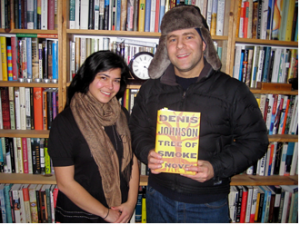
Further Resources
Visit the Blood Orphans’ 09 World Tour Website, see some rocktastic photos of Michael (aka The Douchebag), and check out his own book tour schedule: up next are NYC and Seattle.


